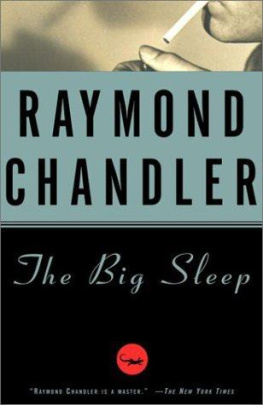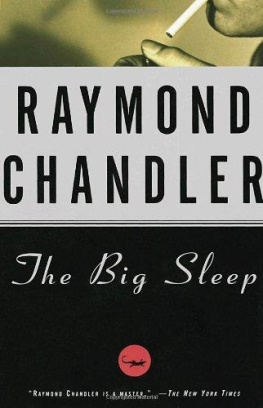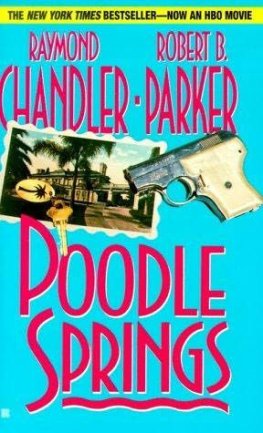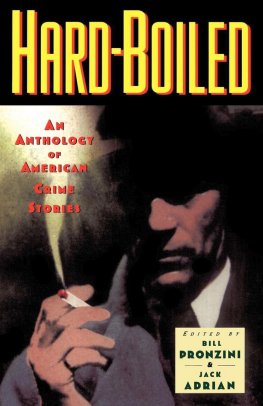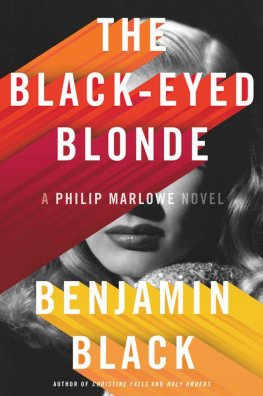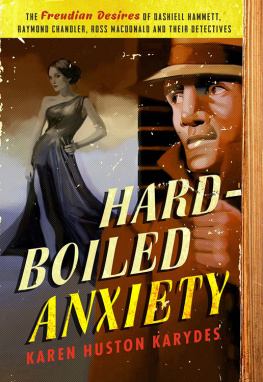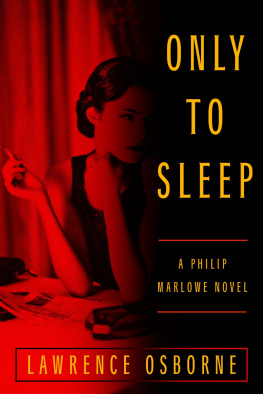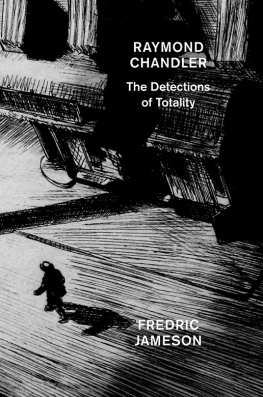Raymond Chandler - Raymond Chandlers Philip Marlowe
Here you can read online Raymond Chandler - Raymond Chandlers Philip Marlowe full text of the book (entire story) in english for free. Download pdf and epub, get meaning, cover and reviews about this ebook. year: 2002, publisher: I Books, genre: Detective and thriller. Description of the work, (preface) as well as reviews are available. Best literature library LitArk.com created for fans of good reading and offers a wide selection of genres:
Romance novel
Science fiction
Adventure
Detective
Science
History
Home and family
Prose
Art
Politics
Computer
Non-fiction
Religion
Business
Children
Humor
Choose a favorite category and find really read worthwhile books. Enjoy immersion in the world of imagination, feel the emotions of the characters or learn something new for yourself, make an fascinating discovery.

- Book:Raymond Chandlers Philip Marlowe
- Author:
- Publisher:I Books
- Genre:
- Year:2002
- Rating:4 / 5
- Favourites:Add to favourites
- Your mark:
- 80
- 1
- 2
- 3
- 4
- 5
Raymond Chandlers Philip Marlowe: summary, description and annotation
We offer to read an annotation, description, summary or preface (depends on what the author of the book "Raymond Chandlers Philip Marlowe" wrote himself). If you haven't found the necessary information about the book — write in the comments, we will try to find it.
Raymond Chandlers Philip Marlowe — read online for free the complete book (whole text) full work
Below is the text of the book, divided by pages. System saving the place of the last page read, allows you to conveniently read the book "Raymond Chandlers Philip Marlowe" online for free, without having to search again every time where you left off. Put a bookmark, and you can go to the page where you finished reading at any time.
Font size:
Interval:
Bookmark:
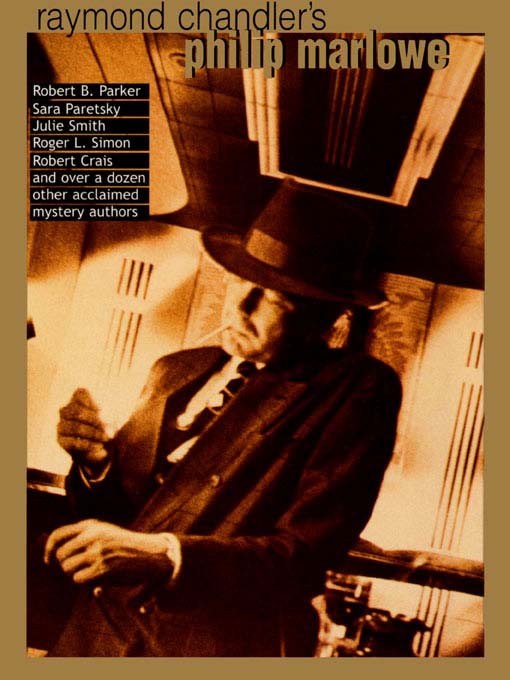
Perfect anthologies do not exist. Very good ones are extremely rare.... Some of the best collections... are not so much anthologies as one-volume libraries. They give you a lot for your money, but only an iron man can hold them up without getting a sprained wrist. If this is the way I must read, I shall stick to Websters Unabridged. There isnt a dull page in it.
Raymond Chandler
I had come to U.C.L.A. in search of some validation for what I was already in the midst of doing. Nearly a hundred years after Raymond Chandlers birth, close to three decades since he had typed the last words of Philip Marlowes literary career, I had invited approximately twenty-five contemporary authors of the mystery story to celebrate Chandlers work, with the consent of his estate, by writing new Philip Marlowe stories.
My guide on that classically sunny Los Angeles afternoon was Edgar Award nominee Robert Crais, a novelist and leading television screenwriter. He looked about Marlowes age, thirty-eight. Something told me Chandler would have liked this man. He was a vindiction of Chandlers hopes for the mystery writer, a well-paid, respected man who aspired to attain Chandlers highest standard, to have his mystery novels treated as literature.
Crais escorted me to the University Research Library, where a large body of Chandlers existing letters and manuscripts is kept. After various explanations, we were given six or seven brown boxes containing folders and envelopes with such tantalizing labels as, Chandler, Raymond, 18881959. The Poodle Springs story. La Jolla, 1959. 23 1. 22 x 14 cm. Typescript with holograph corrections. I nervously pried open that particular envelope and pulled out the contents. I was holding canary yellow pages, standard typewriter sheets cut in half, typed the long way, and tripled spaced. Chandler had used a blue typewriter ribbon, and the visual effect was the exact opposite of what a person might expect from one of the geniuses of hard-boiled detective literature. The manuscript was pretty. The colors reminded me of Monets china in his dining room at Giverny. Canary yellow and royal blue. These were the final colors of Raymond Chandlers Philip Marlowe.
We skimmed the pages and proceeded onto Playback and Chandlers letters, including correspondence to Wilbur Smith of the U.C.L.A. Library that explained the purpose of those yellow manuscript sheets. Chandler wrote that they contained 125 to 150 words and they are so short that you dont get prolix. If there isnt a little meat on each, something is wrong.
Immersed as we were in the papers, Crais reminded me that we only had a few minutes left until the Department closed. I reiterated my desire to find validation in Chandlers words for doing this book.
I returned to the library the next day. I found a missive dated June 3, 1957, written by Chandler to Edgar Carter, about a series of Philip Marlowe TV shows. In it, Chandler argues for his own participation in the shows, but only as the writer of Marlowes dialogue:
... it seems that if I could deliver the character of Philip Marlowe, at the risksomewhat the certaintyof being thought unbearably conceited, I should still be able to believe that Marlowe existed, and not a travesty of him.... After all, a great many writers have been trying to steal him from me for fifteen years or more, and they have never made it yet. I suppose all writers are crazy, but if they are any good, I believe they have a terrible honesty.
At last I had found something in Chandlers own words that related to this book, but it was discouraging at best. Marlowes intolerance for hypocrisy came to mind. Was there any justification to pursue Marlowe with other mystery writers?
I returned to the papers, to Chandlers favorable review of James Sandoes anthology Murder Plain and Fanciful, a part of which opens this foreword. On the last page I found the words which gave me solace for what we intended to do. Chandler wrote about Sandoe:
I have a feeling, although he has not expressed it, that he regards the chronicles of this irrevocable art of the mystery as the only really significant literature of our time, in the special sense that an intelligent preoccupation with the subjectmacabre to some, delicious to others, attractive in some manner to almost allis the frame for almost the only kind of writing we do better than it was ever done before.
It was writing that fired Chandlers mind. It was his love of the potential of the mystery that seized his imagination and propelled his work. His letters overflow with his thoughts about the art of the mystery. His greatest hope for his own work was that it would endure as literature. I think it would be fair to say that his deeply held respect for the mystery as literature is shared by all of the authors in this book. They are Chandlers peers. Many would not be the writers they are had not Chandler followed Hammett and Cain down the back alley of fiction into the realm of art. The contributors to this book are here to honor Chandler, not to steal from him. I think he would be flattered by their attention, just as he was flattered to be elected President of the Mystery Writers of America in 1959. I think he would have gone on to critique each story in this book, piece by piece, until he reached the end of the book and found one story that he liked more than the others, but not enough to call it perfect. Nothing was ever perfect in Marlowes world, yet if it had a basic morality, a common mans nobility, it was worthy of consideration. Chandlers review of Sandoe made me feel that there was honor in this collaboration. For that reason, for the sake of the good intentions of the contributors, I risk this book, and regret only that Chandler is not able to read it.
I WAS CONCEIVED IN Laramie, Wyoming, Raymond Chandler once said, and if they had asked me I should have preferred to be born there. I always liked high altitudes, and Chicago is not a place where an Anglophile would choose to be born. But Chicago was where Raymond Thornton Chandler was born, on July 23, 1888, the son of an Irish immigrant woman named Florence Thornton who had married a Union Pacific Railroad employee named Maurice Chandler. The marriage was not happy. Maurice Chandler drank frequently and long, and Chandler later referred to him as an utter swine. Separation was followed by divorce and in 1896, with her seven-year-old son, Florence Chandler moved to England where they lived in a suburb south of London with Chandlers grandmother and aunt.
Transplanted to London from the American midwest, reared fatherless in a matriarchal household. Chandlers experiences during this period must have been crucial, and the class tensions and concern for proprieties of status and religion which he encountered in England and in Ireland when he visited his uncle may account for the continuing ambivalence he manifested about social class in the novels of his adulthood.
In 1900, Chandlers family had moved to Dulwich so that Chandler could attend Dulwich School, a public school of some standing from which a number of graduates each year proceeded to Cambridge and Oxford. He studied math, music, Latin, French, divinity, the history of England, and geography of the British Isles. Of the 28 boys in his form, Chandler finished the fall term second. In the fall he played rugby, in the spring, cricket. As he progressed through Dulwich, Chandlers class standing was persistently high. He studied periodically in programs designed for boys proceeding to business rather than university. But he nonetheless read in Latin: Caesar, Livy, Ovid, and the
Font size:
Interval:
Bookmark:
Similar books «Raymond Chandlers Philip Marlowe»
Look at similar books to Raymond Chandlers Philip Marlowe. We have selected literature similar in name and meaning in the hope of providing readers with more options to find new, interesting, not yet read works.
Discussion, reviews of the book Raymond Chandlers Philip Marlowe and just readers' own opinions. Leave your comments, write what you think about the work, its meaning or the main characters. Specify what exactly you liked and what you didn't like, and why you think so.

